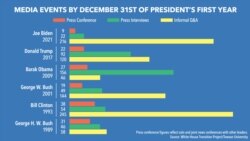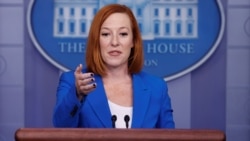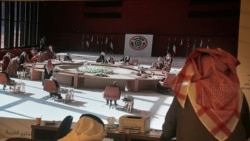“I’m not supposed to be having this press conference right now.” It’s a familiar refrain from President Joe Biden as he walks away from questions fired off by reporters at the end of a planned speech or event.
Avoidance is perhaps an improvement from intense interactions the news media had with the Trump administration. Former President Donald Trump regularly branded reporters as purveyors of “fake news” and the “enemy of the people.” Still, journalists’ frustrations are mounting over a lack of access to Biden and the staff of an administration that vowed to be the most transparent in the nation’s history.
Those frustrations were detailed in research this month in separate reports from Towson University and the White House Transition Project as well as the Committee to Protect Journalists (CPJ).
At the end of his first year in office, Biden has held nine press conferences, fewer than any of his five predecessors at the same point in their presidencies, according to Towson University and the White House Transition Project. He has participated in 22 media interviews, fewer than any of his six predecessors.
During Thursday’s White House press briefing, press secretary Jen Psaki disputed any media shyness by Biden.
“The American people have seen him out there answering questions,” Psaki said in response to a question by VOA. “That's an important part of his engagement with the press and the public.”
Biden does take impromptu questions more frequently than his three predecessors but spends less time answering them, according to research author Martha Joynt Kumar, a professor emerita in political science at Towson University and director of the White House Transition Project.
When presidents take questions from reporters, they do so on their own terms, choosing settings they prefer, Kumar wrote in the report. For Biden, his favored setting is at the end of speeches or prior to getting on the presidential helicopter or plane to or from the White House.
“He's just doing it the way he wants to do it,” Kumar told VOA.
Others say the tightly choreographed and limited media access to the president is driven by his staff.
“I think they see where the president has performed or not performed in press conferences in the past, both in the current role as well as in media appearances in previous walks of his life, and they see it as a risk,” Angela Greiling Keane, president of the National Press Club Journalism Institute, told VOA.
The White House Correspondents' Association has demanded more access.
“The free people of the world benefit when the American president demonstrates his willingness to stand for questions,” the association’s president, Steven Portnoy, told VOA. “We believe more formal opportunities to engage the president on a broad range of public concerns would be in the public interest.”
Limiting exposure
From a political management perspective, the strategy to limit Biden's exposure to journalists and the media may work, said Thanos Dimadis, executive director of the Foreign Press Correspondents Association, speaking with VOA.
“Certainly, this isn't something journalists like, but just as journalists have the right to choose how to report, the people involved in the management of political communication have the right to choose how to exercise such communication,” he added.
While the function of the media remains important in a democracy, Vanessa Beasley, a professor of presidential rhetoric at Vanderbilt University, argues there is room for debate about what the ideal amount and means of access might be in this context.
“A president’s staff wants a president’s message to get framed and amplified for the intended audiences as effectively as possible,” Beasley told VOA, adding that there will always be an inherent interest for staff to set limits and the press to push them. “From a historic perspective, that tension can actually be productive; both ‘sides’ have important jobs to do in a robust democracy.”
In a change from the Trump administration, Psaki holds daily hourlong White House press briefings. Still, she is criticized for taking questions mostly from major American media outlets and television networks, frustrating international journalists and smaller outlets.
It’s difficult to get a question in when you’re not sitting in the briefing room’s first two rows, said Esther Oh, White House producer at Japanese broadcaster NHK.
“The White House has repeatedly vowed to restore partnerships with its allies,” Oh said. “The most obvious way to do that would be to fully utilize major foreign outlets to show that America is indeed serious about restoring international trust.”
Oh pointed out that during Biden’s few press conferences, he has taken questions from only a handful of major media outlets, whereas Trump typically called on many more journalists, including from foreign outlets.
'Night and Day'
Biden’s approach to the media is in stark contrast to Trump’s rhetoric, but concerns about press access remain.
CPJ on Thursday published Night and Day: The Biden Administration and the Press. The report cited limited access to the president, slow responses to requests, the proposed extradition of WikiLeaks founder Julian Assange, restrictions at the U.S. southern border and the administration’s failure to assist Afghan journalists following the troop pullout and Taliban takeover in August.
While not responding to specific complaints, Psaki said that when she took her job as press secretary, Biden conveyed the importance of a respectful tone.
“Media was a big priority for him and ensuring that there was respect even when there's a point of contention or a difficult conversation or back and forth, that is part of democracy, but our objective is to, has been to reinstill normalcy and engagement with reporters,” she said.
While Biden and Secretary of State Antony Blinken have repeatedly stressed the important role of a free press in a democracy, CPJ report author Leonard Downie Jr. told VOA there is a discrepancy between rhetoric and action.
“There's also a discrepancy between what they've said about global press freedom and the lack of action that's been taken so far,” Downie said, pointing to countries like Saudi Arabia and others where journalists are under fire for doing their jobs.
The CPJ report called on the Biden administration to do more for international media, including expediting visas for Afghan journalists at risk now that the Taliban are in power, and holding Saudi Crown Prince Mohammed bin Salman accountable for his role in the killing of Washington Post columnist Jamal Khashoggi.
Some information for this report came from The Associated Press. VOA's Jessica Jerreat contributed to this report.







